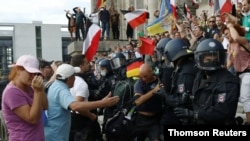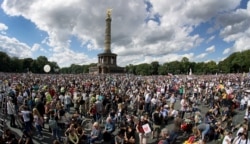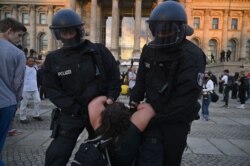Far-right extremists tried to storm the German parliament building Saturday following a protest against the country's pandemic restrictions but were intercepted by police and forcibly removed.
The incident occurred after a daylong demonstration by tens of thousands of people opposed to the wearing of masks and other government measures intended to stop the spread of the new coronavirus. Police ordered the protesters to disband halfway through their march around Berlin after participants refused to observe social distancing rules, but a rally near the capital's iconic Brandenburg Gate took place as planned.
Footage of the incident showed hundreds of people, some waving the flag of the German Reich of 1871-1918 and other far-right banners, running toward the Reichstag building and up the stairs.
Police confirmed on Twitter that several people had broken through a cordon in front of Parliament and "entered the staircase of the Reichstag building, but not the building itself."
"Stones and bottles were thrown at our colleagues," police said. "Force had to be used to push them back."
Germany's top security official condemned the incident.
"The Reichstag building is the workplace of our Parliament and therefore the symbolic center of our liberal democracy," Interior Minister Horst Seehofer said in a statement.
"It's unbearable that vandals and extremists should misuse it," he said, calling on authorities to show "zero tolerance."
Earlier, thousands of far-right extremists had thrown bottles and stones at police outside the Russian Embassy. Police detained about 300 people throughout the day.
Berlin's regional government had tried to ban the protests, warning that extremists could use them as a platform and citing anti-mask rallies earlier this month where rules intended to stop the virus from being spread further weren't respected.
Protest organizers successfully appealed the decision Friday, though a court ordered them to ensure social distancing. Failure to enforce that measure prompted Berlin police to dissolve the march while it was still in progress.
During the march, which authorities said drew about 38,000 people, participants expressed their opposition to a wide range of issues, including vaccinations, face masks and the German government in general. Some wore T-shirts promoting the "QAnon" conspiracy theory while others displayed white nationalist slogans and neo-Nazi insignia, though most participants denied having far-right views.
Uwe Bachmann, 57, said he had come from southwestern Germany to protest for free speech and his right not to wear a mask.
"I respect those who are afraid of the virus," said Bachmann, who was wearing a costume and a wig that tried to evoke stereotypical Native American attire. He suggested, without elaborating, that "something else" was behind the pandemic.
Another protester said he wanted Germany's current political system abolished and a return to the constitution of 1871 on the grounds that the country's postwar political system was illegal. Providing only his first name, Karl-Heinz, he had traveled with his sister from their home near the Dutch border to attend the protest and believed that the coronavirus cases being reported in Germany now were "false positives."
Germany has seen an upswing in new cases in recent weeks. The country's disease control agency reported Saturday that Germany had almost 1,500 new infections over the past day.
Germany has been praised for the way it has handled the pandemic, and the country's death toll of some 9,300 people is less than one-fourth the amount of people who have died of COVID-19 in Britain. Opinion polls show overwhelming support for the prevention measures imposed by authorities, such as the requirement to wear masks on public transport, in stores and some public buildings such as libraries and schools.
Along the route were several smaller counter-protests where participants shouted slogans against the far-right's presence at the anti-mask rally.
"I think there's a line and if someone takes to the streets with neo-Nazis then they've crossed that line," said Verena, a counter-protester from Berlin who declined to provide her surname.
Meanwhile, a few hundred people rallied Saturday in eastern Paris to protest new mask rules and other restrictions prompted by rising virus infections around France. Police watched closely but did not intervene.
The protesters had no central organizer but included people in yellow vests who formerly protested economic injustice, others promoting conspiracy theories and those who call themselves "Anti-Masks."
France has not seen an anti-mask movement like some other countries. Masks are now required everywhere in public in Paris as authorities warn that infections are growing exponentially just as schools are set to resume classes.
France registered more than 7,000 new virus infections in a single day Friday, up from several hundred a day in May and June, in part thanks to ramped-up testing. It has the third-highest coronavirus death toll in Europe after Britain and Italy, with over 30,600 dead.
In London, hundreds of people crowded into Trafalgar Square for a "Unite for Freedom" protest against government lockdown restrictions and the wearing of face masks. The Metropolitan Police warned demonstrators that anyone attending a gathering of more than 30 people may be at risk of committing a criminal offense.






